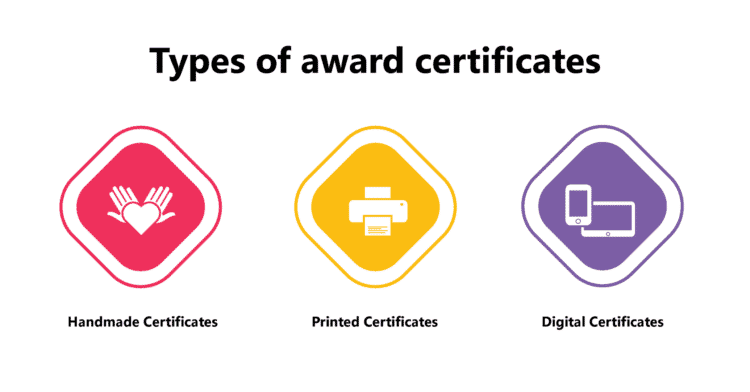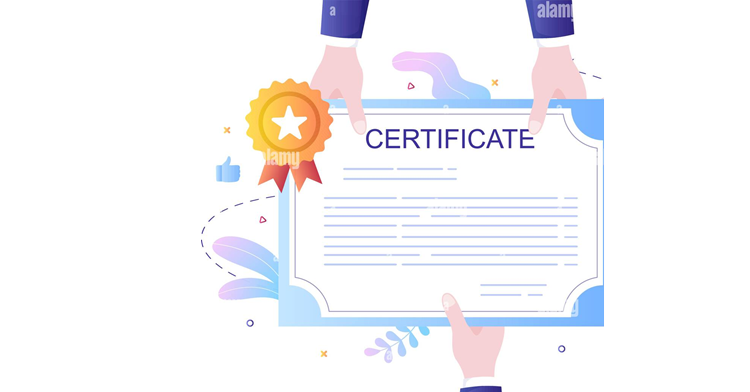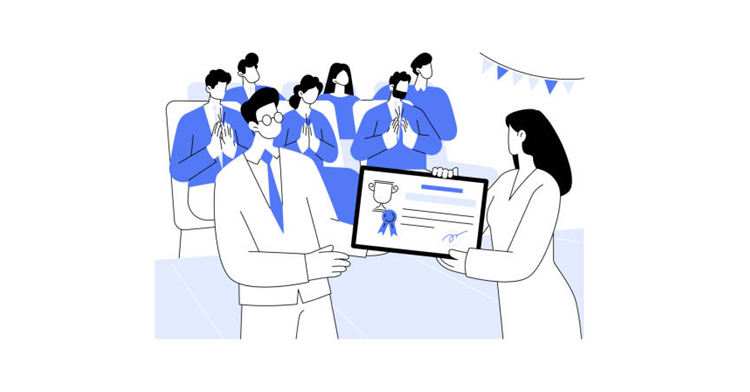1. Award certificates symbolize appreciation for an employee’s exceptional efforts and serve as a motivational tool for others.
2. Award certificates have a rich historical significance; they have evolved from handmade to printed and digital formats, marking a journey of appreciation and recognition.
3. Despite evolving recognition practices, award certificates have stood the test of time.
4. They still hold significant social and emotional value for employees, serving as a status symbol and remaining a crucial part of employee recognition programs.
The award certificate acknowledges the extra mile an employee has gone for the organization. At the same time, it is aspirational for other employees who feel motivated to work harder and perform better to get the same treatment. The award certificate makes the employee feel valued and special.
There are various ways in which organizations recognize their employees, and these practices have evolved over time.
But, an award certificate is one form of recognition that has stood the test of time.

In the early 19th century, a leading sociologist conducted the Hawthorne Experiment, a famous experiment.
The experiment aimed to identify methods for enhancing employee productivity in factories.
It found that if employees received more warmth and appreciation, productivity increased.
The Hawthorne experiment brought employee awards into existence.
Award certificates came soon after in almost every business and industry.
They soon became the best tool for appreciating employees and making them feel more special.
The award certificate may seem to be just a piece of paper but it holds immense emotive value for the recipient.


Generally, organizations used to give these certificates at the end of the year, from the 1950s to the 1980s, or on special occasions.
The original certificates were in thick, handmade paper with the employee’s name written on them.
At that time, the available printers could not print such certificates, and there was no requirement for many award certificates.
Hence, these certificates were handmade with calligraphy and embroidery. Organizations would frame and present these certificates to employees. These certificates have become collectibles in today’s world.

The advent of printers revolutionized the award certificate business.
After the 1980s, the demand for printed certificates increased.
These certificates could be printed quickly and at one-fourth the cost of handmade certificates.
The calligraphy and embroidery were replaced by the new fonts which were more attractive. The machines increased the output significantly.
Additionally, the distribution of award certificates underwent significant changes.
Instead of presenting certificates on specific special occasions, organizations began issuing them as needed.

It is the third and most recent wave in the evolution of award certificates.
After the 2000s, computer technologies grew dominant. Internet and information technology have developed rapidly, creating new start-ups that changed the game’s rules and disrupted traditional practices.
Technology enables organizations to design and create award certificates and send them over email, consuming very few resources and requiring no or minimal manual effort.
Certificate design and styles have also undergone significant improvements. Templates can help in generating a large number of certificates quickly.
3D, augmented, or virtual (AR/VR) certificates replace traditional 2D certificates.

The workload and stress levels of employees have increased over time.
Today’s average employee feels overworked, undercompensated, and demotivated in most organizations.
Hence, organizations must keep their employees happy.
Hence, most organizations have formal recognition policies with monetary or other benefits.
Regardless of the reward’s value, the award certificate still holds significant social and emotional value for the employee.
For the employee, it becomes a status symbol in front of their colleagues, physically or digitally.
The awards certificate is not just a piece of paper or an attachment in an email for the employees. It is a critical part of the employee rewards and recognition program in every organization.

Lead author: Sagar Chaudhuri, the Co-Founder and CEO of HiFives. He is an HR Tech Evangelist with over 25 years of experience in both corporate and entrepreneurial settings. Previously, Sagar has held leadership roles with companies such as Genpact, Infosys, and ICICI Bank. He has an engineering degree from IIT Kharagpur and an MBA from IIM Lucknow. Connect on LinkedIn
Stay updated on the latest HiFives blogs by following us on Twitter (@MyHiFives). Learn more about HR Best Practices on HiFives.